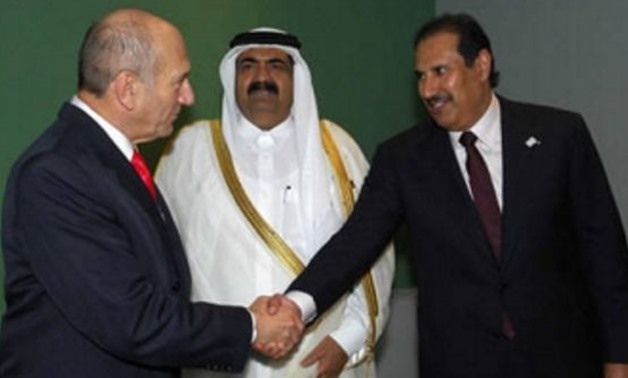
Ex Qatari Foreign Minister Hamd Ben Jasem with Israeli PM Ehud Olmert - Archive
CAIRO-7 July 2017: Qatar has resorted to non-Arab parties, such as Turkey and Iran, for assistance in facing its current crisis with Saudi Arabia, Egypt, the United Arab Emirates and Bahrain. In the meantime, Israel has taken interest in the Qatari crisis because the latter has been deemed by many reports and estimates the most violent between the Gulf countries since the Gulf Cooperation Council was established.
Israeli views on the regional repercussions of escalating diplomatic and commercial sanctions against Qatar, especially those concerning the issue of funding terrorist groups, vary as follows:
First: Disintegration of the Sunni alliance.
Israeli estimates hold the view that the discord between the Arab countries of Sunni majority reflects a deep rift between the United States’ allies, which impedes the efforts aiming at stabilizing the region by fighting ISIS and containing Iran’s regional conduct. In other words, the Qatari crisis, according to Israel, indicates the absence of a unified Sunni bloc in the region, in contrast to the Shiite camp led by Iran.
Second: Deterioration of the Gaza situation and the strengthening of ties between Hamas and Iran.
Some Israeli estimates have expressed the concern that the blockade on Qatar could have a negative impact on the Gaza Strip and the Israeli-Palistinian conflict, especially because of the close ties between Hamas and Qatar. Despite Qatar’s ambition for playing part in the Gaza situation and rearranging the scene in disagreement with the preferences of the Israeli policies by funding Hamas, supporting its leaders and deepening the dispute between Hamas and Fatah, Tel Aviv nonetheless welcomes the flow of Qatari cash into Gaza, either for the purpose of fostering Gaza rebuilding projects or for contributing financial aid and salaries for Hamas officials. Funds of this kind are considered by Israel to be helpful in preventing the Gaza situation from further deterioration and in preventing violent raids against Israel from taking place.
On the other hand, Israel believes that allowing Doha to continue to support Hamas reduces the probabilities of Hamas resorting to Iran in order to compensate for the absence of Qatari funds. In this context, Israeli recommendations to American decision-making bodies revolve around alleviating the Arab and Gulf pressures on Qatar.
Meanhile, Hamas is finally seeking to improve relations with Egypt due to Cairo’s supremely important role in mediating between the Palestinian and the Israeli sides, in addition to its role in curbing Qatari and Turkish influence in Gaza so that the conflict remains distanced from policies of regional alliances and coalitions. In this respect, Israel is anxious about the withdrawal of Qatar’s presence in Gaza, which consequently leads to a stronger Egyptian presence in the region. Such a presence could ultimately cause a renewal of friendly relations between Hamas and the Palestinian Authority, which could, in turn, ease the blockade on Gaza on the expense of Israel.
Third: Rivalry between camps.
Some Israeli analyses of the Qatari crisis attribute part of the crisis to the conflict between two camps, the first of which calls for stability in the region and is represented by Egypt and Saudi Arabia, and the second supports ideologically-based organizations and is represented by the Qatari-Turkish coalition. The second camp is ideologically associated with the Muslim Brotherhood and is supportive of its agenda, in addition to supporting terrorist groups in Libya and Syria, who are no longer willing to be lenient with Qatar’s role in destabilizing their systems. Moreover, the international scene can no longer afford to be lenient with Qatar after the series of terrorist attacks in France, Germany, Belgium, England and others, epecially that international reports indicate Qatar’s unmistakable involvement in funding terrorist groups.
To sum up, in the context related to the possible implications of the Qatari crisis, Israeli political circles push for an approach that seeks to persuade the United States to alleviate the pressures on Qatar, especially that the latter is considered one of the primary stones in the American political body in the Middle East, at least militarily (namely the American air base in Al Udeid, Qatar). Therefore, Israeli estimates stress the necessity of following an approach that seeks to persuade Qatar to cut down its ties with the Muslim Brotherhood and Iran.
Hoda Raouf is a political science research
This article was originally published in Arabic at Al-Siyassa El-Dowlia magazine

Comments
Leave a Comment